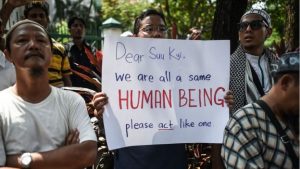Background
Rohinhya are known as the world’s most persecuted minority living in Myanmar, in the region of Rakhine. They are an ethnic group, majority of whom are Muslim, who have lived for centuries in the majority Buddhist Myanmar.
After Myanmar’s independence from the British in 1948, the Union Citizenship Act was passed, defining which ethnicities could gain citizenship. The act, however, did allow those whose families had lived in Myanmar for at least two generations to apply for identity cards. Since 1970, the government of Myanmar consider them as illegal and refuse their citizenship.
Current Issue
Recently, we have seen an escalation of violence against the Rohingya in Rakhine, Only in October 2016, over 74,000 ethnic minority of Rohingya escaped from Myanmar to Bangladesh, seeking refuge. However, not much focus has been given to the humanitarian crisis and inadequate support.
Also, the State Chancellor and Nobel Peace prize laureate Aung San Suu Kyi is been criticized by the public for remaining silent about Rohingya crisis.
Why human rights and security not put into action?
Religious and ethnic differences have been widely considered the leading cause of the persecution. But it is becoming increasingly hard to believe that there are not other factors at play. Especially given that Myanmar is home to 135 official recognised ethnic groups (the Rohingya were removed from this list in 1982).
Here is an interesting article I found online, which convinced me to approach the problem with a different perspective.
Apparently, the land grabbing and confiscation is a common phenomenon in Myanmar. Since the 1990s, military juntas have been taking away the land of smallholders across the country, without any compensation and regardless of ethnicity or religious status.
Land has often been acquired for “development” projects, including military base expansions, natural resource exploitation and extraction, large agriculture projects, infrastructure and tourism. For example, in Kachin state the military confiscated more than 500 acres of villagers’ land to support extensive gold mining.
Development has forcibly displaced thousands of people – both internally and across borders with Bangladesh, India, and Thailand – or compelled them to set out by sea to Indonesia, Malaysia and Australia.
In 2011, Myanmar instituted economic and political reforms that led it to be dubbed “Asia’s final frontier” as it opened up to foreign investment. Shortly afterwards, in 2012, violent attacks escalated against the Rohingya in Rakhine state and, to a lesser extent, against the Karen. Meanwhile, the government of Myanmar established several laws relating to the management and distribution of farmland.
These moves were severely criticized for reinforcing the ability of large corporations to profit from land grabs. For instance, agribusiness multinationals such as POSCO Daewoo have eagerly entered the market, contracted by the government.
It is also known that since 1990, Chinese companies have exploited timber, rivers and minerals in Shan State in the North of Myanmnar.
Also note that among numerous development projects in Myanmar, a transnational pipeline built by China National Petroleum Company (CNPC) connecting Sittwe, the capital of Rakhine, to Kunming, China, began operations in September 2013.
It is also known that Coastal areas of Rakhine State are clearly of strategic importance to both India and China. The government of Myanmar therefore has vested interests in clearing land to prepare for further development and to boost its already rapid economic growth.
Is this a familiar Issue?
Yes it is.
Africa is another victim of these “development projects”. Many big players in the world take advantage of the fertile land in Africa in a context of planting vegetables. In one sense they are developing the African soil but in reality, residents are expulsed to slums where permanent employment, disease, and prostitution are created naturally. Because of many governments and multinational corporations’ cross-linked situation, so called the vicious circle, many people from Africa die from hunger.
Behind the context of economic growth and development, tremendous number of people suffer, human rights taken away from them.
These multinational companies probably needed the Rakhine region for their profit and the government of Myanmar mutually agreed to free the space by confiscating and displacing residents by force.
In line with this, foreign direct investment policy must be reviewed at an international level to PROTECT victims of capitalism.

